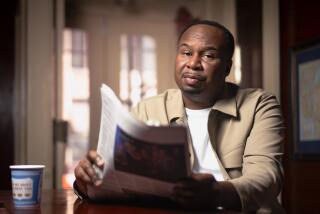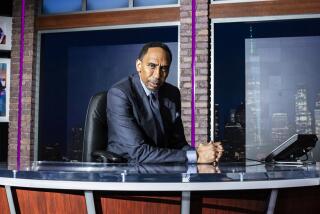Focus : Journalism Undressed
- Share via
Nicolas Kent would be happy if you knew two things: 44% of Americans say they get their political news from talk radio and a 26-year-old with virtually no experience has a good shot at being the one who brings you the evening news in a major market.
Kent, whose controversial documentary series “Naked Hollywood” caused a stir in 1991 and who also produced the series “Naked Sports,” is back--this time with “Naked News,” a four-part look at journalism in the United States.
“Naked News,” says Kent, “is the third part in a trilogy about different aspects of American culture. The common theme to all three series, the major theme, is how the culture of Hollywood and the culture of celebrity has permeated every aspect of American life.”
The four parts of “Naked News” are set to run back to back Sunday night on A&E.; The series was produced for Channel 4 in England, with Kent serving as series producer and Andy Paterson as executive producer.
The first hour, called “The Anchors,” tracks the wanna-be career of Donya Archer, a 26-year-old budding news anchor. When the program was shot last year, Archer was about to begin a job as an anchor at a Fox affiliate in York, Pa.
Archer talks about her experience (she has virtually none), the lessons she has taken to improve her delivery and poise and her desire to work in Los Angeles. She explains that she’s got the same husband-and-wife team of agents who got Dan Rather his contract at CBS. But not once does she mention journalism or express a personal interest in news or information.
“She’s an actress,” says Kent, and the lesson of the program is that these days, that may be all it takes.
Woven throughout Archer’s story are interviews with her high-flying agents and a look at the work of super-consultant Frank Magid, who pioneered the so-called “Action News” format for local news.
“I think the power of consultants is a revelation,” Kent says. “I think seeing the influence of those people should make people think twice when they watch the news.”
Walter Cronkite also weighs in, saying that when he first started, broadcast journalists were paid about the same as police officers and teachers. That, he says, made them a part of the world they were supposed to cover.
The second hour explores the work and influence of mogul Ten Turner.
“The interesting thing about Turner is that he doesn’t speak corporate-speak,” Kent says. “He speaks his own mind. It often lands him in hot water and gets him in trouble, but it’s kind of nice.”
Turner is one of a rare breed of “buccaneering entrepreneurs” who say what they think and battle the consultants and MBAs, Kent notes, saying he was surprised that Turner was so open during the interviews.
“It was amazing to me how unguarded he was in talking about impressing his father and living up to his father’s expectations; [it] is kind of what makes him run even now.”
If the hour with Turner is a profile of a single charismatic man, the next part, a discussion of talk radio, is a mass of personalities. Kent goes on the set with Rush Limbaugh and looks at the radio work of G. Gordon Liddy, Oliver North and others in the fast-talking, hot-button politics world found on the AM dial.
“Being British we have no equivalent at all to the phenomenon of talk radio,” Kent says. “It’s so extraordinary that a medium that was clearly surpassed by television is having such a resurgence.”
Talk radio, Kent says, is very much the stomping ground of conservatives, although a few liberal hosts hold court in Los Angeles and other cities. The reason, he theorizes, is that the message works well with the medium.
“The conservative message has the beauty of simplicity to it,” Kent says. “Liberals by nature [are] always saying that life is more complicated.”
It’s not until the last hour that Kent switches the discussion to the medium of print. Focusing particularly on tabloids, he looks at the New York Daily News and its editor, Martin Dunn.
Tabloids, he says, with their huge, often controversial, headlines are one area where Americans have learned sensationalism from the British. England’s Fleet Street tabloids, with their cheesecake photos and conversational style, paved the way for many of their American counterparts.
All in all, viewers should come away from the series with a sense of skepticism about what they see, hear and read, Kent says.
“I think the prudent thing for anyone to do in a democracy is to take their news from a variety of sources,” he says.
Kent, who recently completed a documentary on the Catholic Church in the United States for HBO, wants to turn his attention next to the American political process. He’s hoping to obtain funding for a look at the 1996 elections.
“I think it’s going to be the most exciting American election in many years,” Kent says. With the increasing polarization between left and right, “there are such fundamentally different images of America competing for power. It’s going to be a turning point.”
“Naked News” airs, in all four parts, Sunday at 8 p.m.-midnight and repeats immediately afterward on A&E.;
More to Read
The complete guide to home viewing
Get Screen Gab for everything about the TV shows and streaming movies everyone’s talking about.
You may occasionally receive promotional content from the Los Angeles Times.






